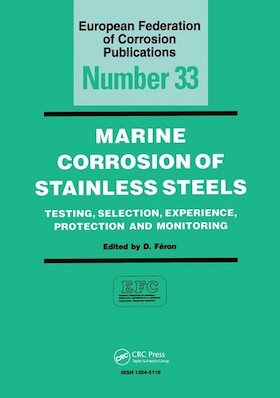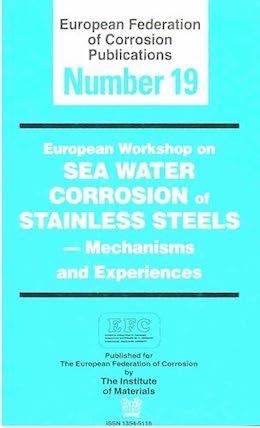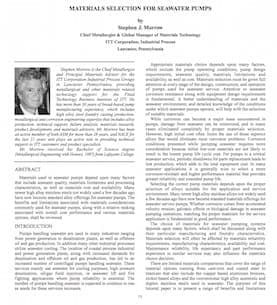
-----
Stainless steel grades suitable for sea water Q&A
Q. Dear Sir
I am a master student of corrosion engineering in sharif university in Teheran. I have studied in corrosion courses that stainless steel is not resistant to sea water and will corrode (pitting corrosion). But our engineers use stainless steel plates and bolts in sea water and they say stainless steel won't corrode in sea water, but we know it is not resistant in conditions which contain chloride, so what is the answer? Can we use stainless steels in sea water or not?
Thank you & Regards

Mehdi Monir
- Teheran, Iran
2002
A. A Yugo and a Corvette are both automobiles, but there is a world of difference between them. It is the same with "stainless steel". One of several stainless steels that are reasonably tolerant to sea water is Monel. 303Se would be a terrible choice. I would certainly want a book on corrosion before making a bold statement either way. NACE, I think it is "National Association of Corrosion Engineers" web site would be a good place to start a search for information.
James Watts- Navarre, Florida
Ed. note March 2023: NACE is now found at AMPP.org
A. Dear Friends
First of all monel is a well know nickel-copper alloy not steel.
I think using small stainless steel parts like bolt and nuts beside the mild steel structures in seawater, would decrease the corrosion rate of stainless steel. However stainless steel marine parts with large surface area could not be a correct choice regarding to pitting corrosion of stainless steel in chloride containing environment.
Regards,
- Teheran, Iran
2006
![]() Thank you Somayeh
Thank you Somayeh
My question was from 4 years ago. Stainless steel has many different grades and lower grades are not suitable for marine applications; it's better to use high grade super duplex stainless steels like DP3W which has PREN (Pitting resistant equivalent number) more than 37 are the best.

Mehdi Monir [returning]
- Teheran, Iran
2006
Testing, Selection, Experience"

on eBay or Amazon
(affil link)
A. Time flies when you're having fun :-)
But there are a hundred readers for every poster, so I'm sure numerous readers profited from this letter in the last four years, Mehdi, and many more will profit further from your update. Thanks!

Ted Mooney, P.E.
Striving to live Aloha
finishing.com - Pine Beach, New Jersey
Ted is available for instant help
or longer-term assistance.
A. Dear Friends,
Also remember if you need a classification approval for your piping systems, nearly no society approves the application of SST parts and piping for seawater systems even for small parts like valve disks.
- Seattle, Washington
2007
A. Hey Mehdi,
316 or 316L stainless works fine in marine AND pool environments. It has been used in the marine industry for years and will continue to be used. Be sure to have the stainless passivated or electropolished before being put into service to increase the corrosion resistance.
Alternatively you can use titanium. I have seen heat exchangers constructed out of titanium used in chlorine and salt water pool heating systems.
electropolishing shop - North Vancouver, British Columbia, Canada
September 17, 2009
A. In answer to the first question yes s/s is suitable for salt water use. 316L is probably the most generally used worldwide. Propeller shafts would be a good example; even lower grade 304 seems to cope very well. The composition lends itself to being tough but malleable for this purpose. However climate does have an impact on the corrosion factor. Proximity to other metals also needs to be taken into the equation. Environment should also be taken into account as it provides the ideal conditions for corrosion activity. S/S will "tea stain", that brown coating that we see on s/s when left in adverse conditions. Remember s/s, as I read it, means that it is less prone to stain but not 'stain.....less'. Any welding needs to be passivated and is a very good point of corrosion if not treated. Surface finish of course is also a big factor. The better the finish the better the corrosion barrier. S/S yes we all take it for granted, but there are many 'compositions'. Like steel, each has it own use.
Brian Cookeengineering - Tecoma, Victoria, Australia
December 22, 2011
Q. Hi,
I am Ashish from India, we have a project to pump sea water at 40 bars. The seawater is having a TDS of 8000 and chloride content of 5200 ppm what grade of SS pipe is right for the purpose.
Regards,
Project Consultant - KOLKATA, WEST BENGAL, INDIA
May 1, 2009
A. Here is an article on Stainless Steel and where the various grades should be used:
Which grade of Stainless Steel should I choose for my fastener?
- Auckland, New Zealand
June 10, 2013
![]() Thank you to everybody for discussion like this, is very useful for everyone who is interested in metallurgical issues.
Thank you to everybody for discussion like this, is very useful for everyone who is interested in metallurgical issues.
Laguna Verde Nuclear Power - Veracruz, Mexico
February 3, 2016
A. I found the following article very useful and interesting on the subject, although sounds a bit late to share, I see that people would occasionally come for a visit! .
Ali Reza ManiPIDMCO - Shiraz,Iran
June 19, 2016
Q. No doubt 316/316L won't be bad choice for marine application but as it is said that water will be pumped at a pressure of 40 bar. As you might be aware of the fact that 300 series austenitic stainless steel is highly susceptible to chloride stress corrosion cracking. How would 316L will respond under this circumstance?
Ankit Kalra- Hisar haryana India
September 2, 2016
A. If it's a marine environment and you're locked into stainless, I wouldn't want to use anything less than 316. A Duplex grade would be better still.
But I would at least investigate and consider some type of plastic that isn't going to have the corrosion problems.

Ray Kremer
Stellar Solutions, Inc.
McHenry, Illinois

September 13, 2016
A. Using austenitic SS (304/316 etc.) with sea water is a gamble.
A lot of folks insist they use SS316 piping with sea water without problems, but there is a risk. The chromium content in 304/316 reacts with environmental oxygen to form the chrome dioxide coating that makes 304/316 corrosion resistant. This is passivation. There is ca. 0,5V pot. diff. between active and passive 304/316, so if the passivation is not good you are effectively using two physically connected dissimilar metals in an electrolyte, which are the conditions you need for galvanic corrosion to take place. The passive 304/316 will 'attack' the active 304/316 resulting in pitting corrosion. Fresh sea water has sufficient oxygen that the protective layer is constantly replenished, so corrosion resistance can be good.
But if you have anywhere that sea water can get trapped and stagnate, like a threaded connection, then you have a big risk of corrosion. Stagnant seawater has no oxygen, so the oxide coating is not constantly replenished, so the mechanism described above kicks in and you get pitting corrosion at the threaded connection. Most maritime class societies do not permit use of 304/316 with sea water.
Paul Haye- Drammen, Norway
June 23, 2017
![]() Thanks for such an insightful but concise explanation, Paul. Now I understand why boat parts can safely be made of type 316 stainless steel and show no corrosion, but piping built of the safe material might be a disaster.
Thanks for such an insightful but concise explanation, Paul. Now I understand why boat parts can safely be made of type 316 stainless steel and show no corrosion, but piping built of the safe material might be a disaster.
Luck & Regards,

Ted Mooney, P.E. RET
Striving to live Aloha
finishing.com - Pine Beach, New Jersey
Ted is available for instant help
or longer-term assistance.
Q. Hi, I'm a new project engineer working on continuous stirred tank reactor including 0.025M NaCl. The equipment is intended for use in the education field i.e. small scale for lecturers to demonstrate to their students. As I'm designing this my superior suggested using chrome lining on top of the already stainless steel reactor tank. Is this a common practice? I think that the concentration of the chloride would be too low to cause any effect on the stainless steel.
Muhammad FRProject Engineer - Malaysia
March 21, 2023
A. Hi.
The salt content of your water seems to be 20-25X as dilute as seawater; that's really very little salt. And many stainless steels are fine even in seawater. I don't know what your reactor looks like, but chrome plating it would probably be rather impractical anyway. I should think you could use a good grade of stainless like 316 or 317 and not expect any trouble.
Luck & Regards,

Ted Mooney, P.E. RET
Striving to live Aloha
finishing.com - Pine Beach, New Jersey
Ted is available for instant help
or longer-term assistance.
![]() Thanks so much Ted, it's a pleasure gaining some knowledge on engineering from you.
Thanks so much Ted, it's a pleasure gaining some knowledge on engineering from you.
- Malaysia
March 22, 2023
A. Hi again. You're very welcome, but I'm growing old so please try to help others with their questions here when you have a chance; we have thousands, so if you search the site for your areas of expertise you'll surely find open questions.
Luck & Regards,

Ted Mooney, P.E. RET
Striving to live Aloha
finishing.com - Pine Beach, New Jersey
Ted is available for instant help
or longer-term assistance.
this text gets replaced with bannerText

Q, A, or Comment on THIS thread -or- Start a NEW Thread

